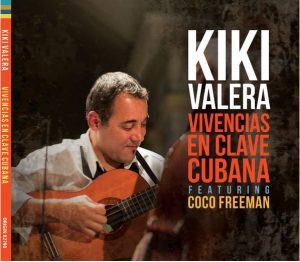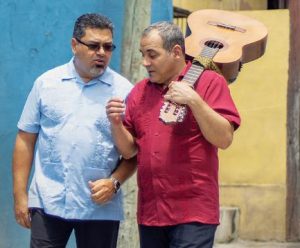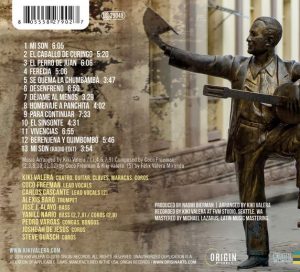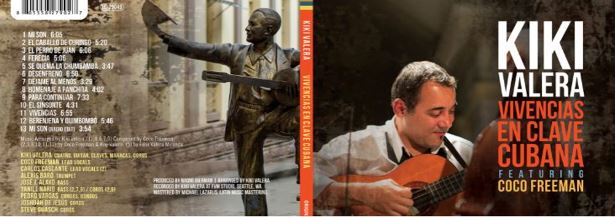This post is also available in:
 Español
Español
Veteran Cuban musician Kiki Valera launched his debut album “Vivencias en Clave Cubana”, where he brings the flavor of the original “son“, of which he is inheritor through La Familia Valera-Miranda.
Felix Enrique “Kiki” Valera truly has the Cuban “son” in his veins. He found out through a Cuban musicologist who did his research for his doctoral thesis on the origins of the Cuban “son” and discovered that his family, La Familia Varela-Miranda, had preserved in their music part of the “son” in its original form.
Cuban “Son” and La Familia Valera-Miranda
Salsa music has its roots in the music of Latin America, but it pulls more heavily from the music of the Caribbean. And from that body of music, its skeleton is Cuban music. Some have said that Salsa is just another name for Cuban music. Although this statement is not completely true, it’s not far from the mark. And yet, the spinal cord of that musical skeleton is the Cuban “son“.

The roots of the “son” lie in the mountains of the western region of Cuba, known as “Oriente“. From there it migrated to Santiago, the main city of the region, where the “guajiros” went looking for work. It’s Santiago that usually takes the credit for being the birthplace of the “son“.
It turns out that it’s from those rural parts of “Oriente” where Kiki and Coco Freeman lived and learned their music.
Kiki Valera is the eldest son of the Familia Valera-Miranda. His ancestors have been playing music as far back as the late 1800s. As Kiki recently told me, “in my house, we didn’t listen to music that much, we mostly played it.”
For decades, the Familia Valera-Miranda played music for their own entertainment. His great-great-grandfather, was a “mambí“, a term used for those who fought for Cuba’s independence from Spain. He and his family played the “tres”, guitars, and all the other variants of the instrument. Besides the obvious Spaniard influence, the music back then was also influenced by the Haitian immigrants, who brought the Bantú culture with them.
Dr. Danilo Orozco, in his research of the origins of the “son“, landed at the doorsteps of the Valera-Miranda residence in San Luis. He found that the Familia Valera-Miranda had preserved a version of the original format of the “son” in their music, without them even knowing it.
“Vivencias” of Kiki and Coco
The Cuban “son” has many variants, and each artist gives it their own spin. Now you know that Kiki Valera’s music comes from one of the purest forms of this rich musical genre.
The story of how Kiki and Coco teamed to make this recording is just as interesting.
Coco Freeman was from the nearby town of Palma Soriano. Kiki and Coco met during music competitions, where they represented their respective cities, and would eventually end up playing together representing their region.

As they grew into adulthood, they nourished a great friendship. They kept in touch as they would frequently cross paths with their respective music bands. When the Familia Varela-Miranda decided to formalize as a musical group a couple of years after Dr. Orozco’s recorded documentary of his research, Kiki re-joined La Familia and lost contact with Coco.
About 6 years ago, Kiki Valera ended up moving to Seattle after meeting his to-be wife Naomi on one of her trips to Santiago de Cuba.
After losing contact with Coco for about 20 years, Kiki found him on Facebook about two years ago as Coco moved to Miami.
“Vivencias en Clave Cubana” emerged during one of their Miami-Seattle long-distance conversations. They decided to make an album together, with Coco writing the songs either alone or with Kiki’s help. Coco would sing the songs to Kiki over the phone, and Kiki recorded them in order to use that to make the musical arrangements.
Once all the songs were set, Kiki re-arranged the house basement to convert it into a recording studio. He and his musicians recorded the music, and Coco Freeman flew in from Miami to record the voices for the tracks.
Music in “Vivencias en Clave Cubana”
Now that you know a little about Kiki and Coco, let’s get into the music.
The music in “Vivencias en Clave Cubana” is superb. As I mentioned above, the songs are not covers of old classics, but rather new lyrics based on the “vivencias” (life experiences) of both Kiki and Coco from their days in Cuba.
And the music is fantastic! Kiki plays the Cuban “cuatro”, an instrument he discovered in the streets of Santiago while he was a teenager. Even though he had been playing the “tres” since age 6, he fell in love with the “cuatro” and never looked back.
“The Cuban ‘tres’ has three pairs of strings. The Cuban ‘cuatro’ has four sets of strings”; Kiki explained to me during our conversation. “This allows for a richer sound with more harmonic options than with the ‘tres’. I immediately loved the sound of the instrument”, he added.

The instrumentation for “Vivencias en Clave Cubana” is the same as Kiki had in La Familia Valera-Miranda, with the addition of the trumpet.
“For this project, I added the trumpet because it enriches the sound to that of a ‘conjunto’, making it sound more contemporary”, continued Kiki.
Note: You can check the full instrument lineup and credits in the adjoining photo.
The 12 songs in “Vivencias” tell stories of daily life in Cuba. In that, they match the themes of typical “son” songs, except that these are originals. One exception of this theme is “El Son” which talks about the genre itself. In the video of this song, which you can see below, Kiki’s brother plays the bongo and his mother plays the maracas, as she does with La Familia.
Another exception is “Se Quema la Chumbambá”, a song written by Kiki’s father Felix (who passed away in 2018), which has been recorded and played by La Familia Valera-Miranda for many years.
Carlos Cascante, the singer for the Spanish Harlem Orchestra, makes a guest appearance in “El Caballo de Curingo”.
The music in this album has swing, displaying why the “son is the most sublime for the soul’s enjoyment” (as Miguel Matamors wrote). Since most groups play “son” with a “tres”, you’ll notice the difference in the richness of the music with Kiki’s “cuatro”.
In addition to all of what I mentioned above, the album’s sound is excellent. Kiki did a superb job to assure the recording quality and mastering (done by Michael Lazarus) were first class. This shows in the end result of the album.
Another Great Origin Records Album
“Vivencias en Clave Cubana” was released under the Origin Records label. This happened thanks to the suggestion of pianist Oscar Hernandez (Alma Libre and Spanish Harlem Orchestra) who was pleased with his experience with them.
Although Origin is a Jazz label, they agreed to release Kiki’s album. In that regard, trumpeter Thomas Marriott, who lives in Seattle and is signed with Origin, helped with some introductions.
All in all, “Vivencias en Clave Cubana” is a truly enjoyable album. As you listen to this album, it’s also good to know that this music comes from the true bloodline of the Cuban “son“.
I hope you enjoy this pure brand of Cuban “son” as much as I do.

